- Home
- John Harris
A Funny Place to Hold a War
A Funny Place to Hold a War Read online
Copyright & Information
A Funny Place To Hold A War
First published in 1984
Copyright: Juliet Harris; House of Stratus 1984-2011
All rights reserved. No part of this publication may be reproduced, stored in a retrieval system, or transmitted, in any form, or by any means (electronic, mechanical, photocopying, recording, or otherwise), without the prior permission of the publisher. Any person who does any unauthorised act in relation to this publication may be liable to criminal prosecution and civil claims for damages.
The right of John Harris to be identified as the author of this work has been asserted.
This edition published in 2011 by House of Stratus, an imprint of
Stratus Books Ltd., Lisandra House, Fore Street, Looe,
Cornwall, PL13 1AD, UK.
Typeset by House of Stratus.
A catalogue record for this book is available from the British Library and the Library of Congress.
EAN ISBN Edition
0755102460 9780755102464 Print
0755127420 9780755127429 Mobi/Kindle
0755127706 9780755127702 Epub
This is a fictional work and all characters are drawn from the author’s imagination.
Any resemblance or similarities to persons either living or dead are entirely coincidental.
www.houseofstratus.com
About the Author
John Harris, wrote under his own name and also the pen names of Mark Hebden and Max Hennessy.
He was born in 1916 and educated at Rotherham Grammar School before becoming a journalist on the staff of the local paper. A short period freelancing preceded World War II, during which he served as a corporal attached to the South African Air Force. Moving to the Sheffield Telegraph after the war, he also became known as an accomplished writer and cartoonist. Other ‘part time’ careers followed.
He started writing novels in 1951 and in 1953 had considerable success when his best-selling The Sea Shall Not Have Them was filmed. He went on to write many more war and modern adventure novels under his own name, and also some authoritative non-fiction, such as Dunkirk. Using the name Max Hennessy, he wrote some very accomplished historical fiction and as Mark Hebden, the ‘Chief Inspector’ Pel novels which feature a quirky Burgundian policeman.
Harris was a sailor, an airman, a journalist, a travel courier, a cartoonist and a history teacher, who also managed to squeeze in over eighty books. A master of war and crime fiction, his enduring novels are versatile and entertaining.
Author’s Note
Although this story is fictitious, the struggle against the U-boats from West Africa is not. The author was stationed in Sierra Leone at around the time in question and many of the incidents in the narrative occurred while he was there, many of them involving him. This is mentioned to indicate that the idea is far from unbelievable.
The Germans were always trying to hamper British countermeasures in the Western Desert by their efforts off Freetown where, for the British, there was one large and unchangeable problem: Sierra Leone – indeed every British possession in West Africa – was entirely surrounded by Vichy French territory, and as Captain W S Roskill says in Vol. I of The War at Sea ‘…the possibility of the Germans filtering into the French West African colonies bordering our route to the Cape was alarming…’
The title comes from a comment made there by a famous stage personality in the only professional concert party the author ever saw in six years in uniform.
Part One
Stranglehold
‘…There is a great need for more surface and air escorts in the area Gambia–Sierra Leone. Convoys for the Middle East via Cape Town from the UK or the USA routed out into the Atlantic via the Azores make their landfall in this area, and Sierra Leone with its good harbour is the only safe place where convoys can put in for supply and watering…’
Commander-in-Chief, South Atlantic,
to Admiralty, 16 Sept 1941
‘…There are many local problems in Sierra Leone which could profitably be exploited. The place is a mixture of nationalities – Creoles, tribesmen, Indians, West Indians, Syrians, and Europeans. The Creoles are unpopular with the genuine Africans and the Syrians are unpopular with all. Rice is a constant source of disagreement and the Syrians have been getting a stranglehold on supplies. The anger at this most important of local problems should be used and, because of the long border which is common to French territory, it should not be difficult to plant agents. Trouble in Freetown could well delay the supplying and watering of convoys from England or America for the Middle East…’
Appendix to short appreciation of the
enemy situation–Führer Conference
on Naval Affairs, 9 Sept 1941
One
With the temperature in the region of a hundred, the heat was stifling. The building stood with all the others that comprised RAF, Jum – the officers’ mess, the headquarters block, the sergeants’ mess, the dining hall, and all the great elephant-like Nissens that housed the men – on a spit of land that divided into two separate streams a tributary of the Bunce river. The sky above it was brilliant with stars that hung in the sky like globes.
Constructed of timber and roofed with tarred felt, inside the building had been touched out here and there with the pale blue they used on the aircraft to give a fragile semblance of gaiety. At one end was a stage and a proscenium arch made of lengths of salvaged plywood with, in the centre, a crude crest bearing the words The Jum Jesters. The curtains, bought cheaply in the native market and run up by local tailors, made it a tawdry imitation of a theatre into which three or four hundred bored men crammed whenever there was a film or a home-made concert to watch. Neither was ever very professional. The projector was old – Blood and Sand, with Tyrone Power and Rita Hayworth, had broken down nine times before being abandoned – while the camp concert party was cheered chiefly for its courage.
Alternative entertainment was limited, however. You could sit in the huts, with the lights – never very bright at the best of times – turned down when the theatre was in use or the projector was working, and try to write letters, with, of course, a blotter under your hand against the sweat that stuck the paper to your wrist or dripped in steady drops from the end of your nose. You could read a book – if you could find a book. You could wander the camp in search of a beer, but, since it was rationed to a mere three bottles a month and the canteen could never match the ration, anyway, the joy was in the chase rather than the capture. You could – always foolishly but invariably a relief – scratch until they were suppurating the sores raised by the friction of your clothing on your sweat-soaked skin. You could worry about the possibility of dysentery or malaria or the condition of your foot rot. As Squadron Leader Greeno, the camp medical officer, liked to say, ‘There are no great athletes here, but there’s a great deal of athlete’s foot.’ Finally you could listen to the ping and whirr of the mosquitoes or the festival chorus of the frogs, have your hair cut in funny patterns such as three dots and a dash or a V for Victory, grow a large moustache, or merely contemplate your navel.
There certainly wasn’t much else. There wasn’t even a decent war, and the incidence of going round the bend among men brought up in sophisticated cities and flung down in this God-forsaken spot close to the Equator in Sierra Leone was surprisingly high. Life at RAF, Jum, consisted largely of foot rot, gut rot and nut rot.
The more enterprising made something of the place, of course, as they always did, and the theatre was just one example of what they could do when they tried. To give the place the semblance of being a real theatre, one of the headquarters telephone operators, Aircraftman First Class Anthony Derek Tristram, known to al
l as ‘Trixie’ because of his slender figure and the fact that he liked to bleach his hair, pluck his eyebrows and tie up his mosquito net with pink ribbon instead of the usual tough white tape, was gracing the centre aisle dressed as an usherette. Trixie never saw anything odd in shaving his legs and wearing women’s clothing for a lark, and at that moment, carrying a tray and wearing women’s high heels and black stockings, a paper rose behind his ear, and a short fluffy skirt made of mosquito netting, he was mincing up and down with a great deal of hip-wiggling, calling out, ‘Cigarettes, chocolates, French letters’. Like many of his kind, he was possessed of a sharp sense of humour, and the idea of dressing as an usherette was unrepentantly his.
Trixie repelled most people and Squadron Leader Greeno had more than once objected to his appearance on this sort of occasion, but he was always overruled by the commanding officer who had served in Iraq and thought it amusing. By this time most of the men at Jum had accepted Trixie and his boyfriends, and mostly they ignored him because West Africa, and particularly isolated Jum, had a strange effect on men so that many on the sexual borderline were touched by the fact that they never ever saw a white woman and very rarely a black one.
And tonight was a special occasion. For the first time in the memory of anyone at Jum – and a few had been there a very long time – a concert party was appearing before them. Not the camp concert party, but a real one.
They were under no delusions that it was there for their special benefit. They all knew it was on its way to India but, since the ship that was carrying it had paused in Freetown for watering and supplies, the opportunity had been taken to put on a show for the top brass at headquarters, where the Rev. Daniel Morgan, the padre at Jum, had happened to bump into it and argued fiercely that it was time someone remembered the poor devils in the swamps at Jum.
They couldn’t believe their luck and the cinema was packed with impatient men sweltering in its humid confinement, every one of them in the anti-malaria order of mosquito boots, long trousers, buttoned shirt necks, and sleeves rolled down and fastened. As they gazed at the curtains, their clinging garments were black with sweat under the armpits and down the spine.
The lights died and, as the pianist of the Jum Jesters started to pound out an introductory tune, the curtains swung back to reveal a solitary figure on the stage. A real live professional comedian! A man they’d heard of even before the war! He was standing by the footlights, his shirt as soaked with sweat, as anyone else’s, the pink blobs of insect bites clear on his arms, dabbing at his damp face with a red handkerchief.
‘This,’ he said, ‘is a bloody funny place to hold a war.’
The quip brought a roar of laughter because it was a bloody funny place to hold a war.
Mary Kingsley, the Victorian ethnologist, who knew it well, had once been told, ‘When you’ve made up your mind to go to West Africa the best thing you can do is get it unmade again as quickly as possible and go to Scotland instead,’ and it was a pretty fair comment. Early explorers had described crabs standing on their hind legs, oysters growing on trees and fishes walking on dry land. Nobody had believed them, but there was truth in the statements because the land crabs did rear upright, oysters did grow on the curving roots of the mangroves, and the mudhoppers, small grey creatures like fish, did move about on two tiny legs.
The spit of land on which RAF, Jum, was situated, was red and stony and where it ran down to the water the flats at low tide were an ugly expanse of black mud. The nearest civilization, the Creole town of Hawkinge, was several miles up the red laterite road from the camp gates, a collection of native huts, thatched – or tin-roofed stone houses, and ramshackle shops and shacks. Recently, the native population had begun to resent the presence of hundreds of white men in the area and now, for safety, it was out of bounds, and entertainment for the inhabitants of Jum RAF camp was entirely in their own hands and never very easy to come by because after dark there was never enough light to read or write, and never enough to eat or drink – not even fresh water.
The area had once been notorious as the White Man’s Grave and there was a mossy tombstone in the local graveyard on which it was recorded that three hundred British soldiers had once died there of fever in three days. The sound of the mosquito that filled the dark hours was always a reminder of past tragedies and tragedies to come, and though quinine had reduced the death rate, that was about all you could say of it, because the climate hadn’t changed and there was still malaria, yellow fever, leprosy, consumption and elephantiasis, and above all witchcraft and fetish that made fit black men die when they shouldn’t. In Sierra Leone the improbable was normal and even the impossible occurred occasionally. The time to leave, old Coasters liked to say, was after the first hour. Otherwise, you would never go. Unfortunately, none of the men at Jum had much choice. They had been transported there by kind permission of the government because there was a war on and were due to stay until their time was up.
Making a joke of slapping at the mosquitoes, the comedian held up his hand and the laughter faded.
‘Before we start,’ he said, ‘I’ve got an announcement to make. We’re being honoured tonight by the presence of His Excellency, the Governor, his wife, and members of his staff and their ladies.’ He indicated the seats at the front where the officers sat around the group captain in command: the wing commanders of the two flying-boat squadrons operating from the station – Molyneux, who ran the Catalinas, and Mackintosh, who ran the Sunderlands; a naval doctor from Freetown on a visit to his brother, Squadron Leader Greeno; the padre; one or two army officers from the West African Frontier Force; and a languid lieutenant-colonel called Cazalet, once of the Green Howards but since Dunkirk and a severe wound, in charge of security in the area.
The comedian gestured to them to make room and there was a lot of shifting about, to leave a group of empty chairs. Only once before, when the naval depot ship, Philoctetes, had sent up a concert party from Freetown, had a woman turned up at Jum. As she had appeared on the stage, somebody had shouted, ‘Don’t bother to sing. Just stand there,’ and even then she had turned out to be a man.
The comedian beamed his approval. ‘If you don’t mind waiting just a moment or two,’ he went on, ‘we don’t want to start without them, and when they arrive let’s give them a good reception because you don’t often see people like that up here and they’re coming tonight especially to show how much they appreciate what you chaps are doing.’
Touched by pride – martyred pride – the audience responded willingly and eyes began to swivel towards the door. Then the comedian’s face changed. ‘Here they are, boys! Let’s give them a big welcome!’
As he began to clap, accompanied by the audience, every head turned excitedly. The Governor and his wife! His staff and their ladies! This was something to see. Most of them hadn’t seen a white woman for over a year.
But the group that swept into the hall were led by a red-nosed man in a travesty of diplomatic uniform, his chest chandeliered with ribbons and sashes hung with old aeroplane parts. His ‘wife’ was another man enormously padded out with cushions, and his staff and their ladies were the most outrageous group imaginable.
The shout of laughter that rose from the packed benches set the tone of the show. This, they thought, was better than the Jum Jesters, with their tired jokes and smutty jingles about camp life. They settled back to enjoy themselves.
Near the great steel hangar which had been erected on the only patch of flat land near the water’s edge, a narrow jetty projected from the concrete apron over the hard mud surface that bordered the creek. It was built of planks and had been patched and repatched with more planks and beaten-out petrol tins. Resting on wooden piles driven into the mud, it supported two huts, both built from aeroplane packing cases and both looking vaguely as if they’d been lost from a native shanty town.
One of them contained the desk of the officer in command of the marine craft section; the other was the duty crew room, with a small section lik
e a telephone booth stuck on the end for the corporal coxswain who acted as piermaster. Past these two huts flowed all the traffic that supplied the servicing, fuelling, arming and crewing of the two squadrons of flying boats operating from the river Bunce.
The men in the crew room, like everyone else at Jum, were lean and thin, their skin the saffron colour that came from the daily intake of mepacrine and salt tablets, their shirts, like those of the men in the cinema a quarter of a mile away, uniformly soaked with sweat. In the middle of the floor, between the three shabby iron bedsteads on which they rested during the night when there was no flying, stood a tall cylindrical coffee can. To replace the moisture they lost as sweat as they worked, it was filled during the day by what the cookhouse insisted was coffee. Nobody thought much of the contents. ‘It’s all made from army biscuits,’ they claimed. ‘Thick coffee’s porridge and thin porridge’s coffee.’ It made a good swimming pool for mice.
The interior of the hut was squalid in the extreme. Despite the hole cut in the side which did duty as a window, it was stifling in the still air of the creek, and even the knowledge that their night duty gave them the next day off wasn’t much comfort to the duty crew, because they knew there was nothing to do with it when they got it.
On both sides of the jetty there was nothing but mangrove swamps. During the day, though well-stocked with fauna, the swamps were still and silent. At night they came to a clamour of life with the splash of jumping fish, the whirr of crabs, strange groaning sounds from the trees, and the sighing cough of crocodiles. At this moment, however, over the sound of the crickets’ perpetual arguing – ‘She did,’ ‘She didn’t,’ ‘She did’ – came a clatter of feet on the loose boards of the ramshackle jetty, and the duty crew put out their cigarettes and rose to their feet. One of the Catalina flying boats was about to take off.

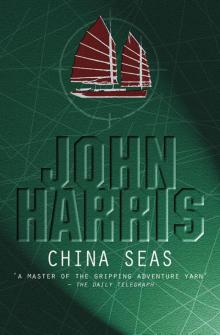 China Seas
China Seas The Mercenaries
The Mercenaries Road To The Coast
Road To The Coast The Thirty Days War
The Thirty Days War The Old Trade of Killing
The Old Trade of Killing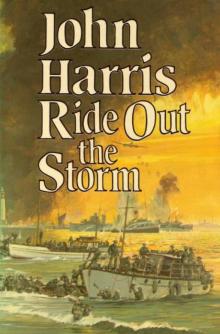 Ride Out The Storm
Ride Out The Storm Corporal Cotton's Little War
Corporal Cotton's Little War Fox from His Lair
Fox from His Lair Paint The Rainbow
Paint The Rainbow Flawed Banner
Flawed Banner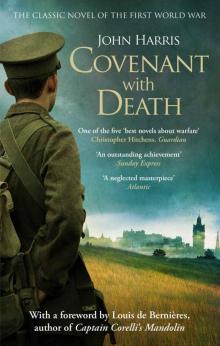 Covenant with Death
Covenant with Death So Far From God
So Far From God The Sea Shall Not Have Them
The Sea Shall Not Have Them The Cross of Lazzaro
The Cross of Lazzaro Smiling Willie and the Tiger
Smiling Willie and the Tiger Harkaway's Sixth Column
Harkaway's Sixth Column The Sleeping Mountain
The Sleeping Mountain The Claws of Mercy
The Claws of Mercy North Strike
North Strike Picture of Defeat
Picture of Defeat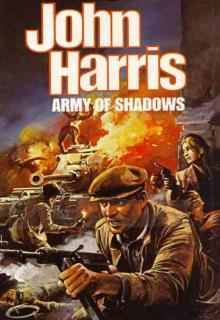 Army of Shadows
Army of Shadows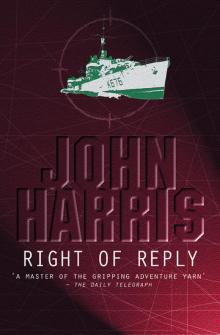 Right of Reply
Right of Reply Getaway
Getaway The Lonely Voyage
The Lonely Voyage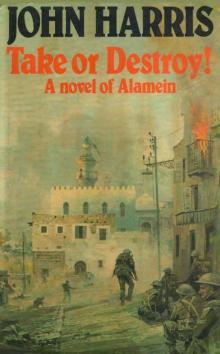 Take or Destroy!
Take or Destroy!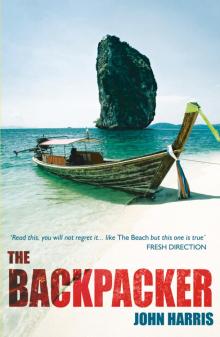 The Backpacker
The Backpacker A Funny Place to Hold a War
A Funny Place to Hold a War Swordpoint (2011)
Swordpoint (2011) A Kind of Courage
A Kind of Courage